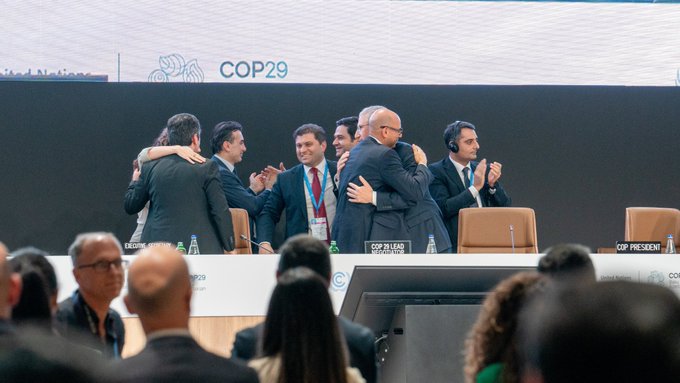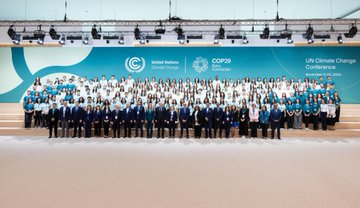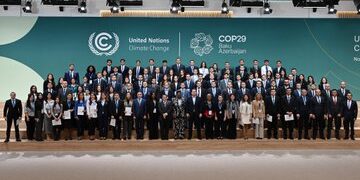UN Climate Change News, 24 November 2024 – The UN Climate Change Conference (COP29) closed with a new finance goal to help countries protect their people and economies against climate disasters, and share in the vast benefits of the clean energy boom.
With a central focus on climate finance, COP29 brought together nearly 200 countries in Baku, Azerbaijan, and reached a breakthrough agreement that will triple public finance to developing countries, from the previous goal of USD 100 billion annually, to USD 300 billion annually by 2035.
COP29 also agreed to secure efforts of all actors to work together to scale up finance to developing countries, from public and private sources to the amount of USD 1.3 trillion per year by 2035.
Known formally as the New Collective Quantified on Climate Finance (NCQG), it was agreed after two weeks of intensive negotiations and several years of preparatory work, in a process that requires all nations to unanimously agree on every word of the agreement.
“This new finance goal is an insurance policy for humanity, amid worsening climate impacts hitting every country,” said Simon Stiell, Executive Secretary of UN Climate Change. “But like any insurance policy – it only works – if premiums are paid in full, and on time. Promises must be kept, to protect billions of lives.”

“It will keep the clean energy boom growing, helping all countries to share in its huge benefits: more jobs, stronger growth, cheaper and cleaner energy for all.”
The International Energy Agency expects global clean energy investment is set to exceed USD 2 trillion for the first time in 2024.
The new finance goal at COP29 builds on significant strides forward on global climate action at COP27, which agreed to a historic Loss and Damage Fund, and COP28, which delivered a global agreement to transition away from all fossil fuels in energy systems swiftly and fairly, triple renewable energy and boost climate resilience.
COP29 also reached an agreement on carbon markets – which several previous COPs had not been able to achieve. These agreements will help countries deliver their climate plans more quickly and make faster progress in halving global emissions this decade, as required by science.
Stiell also acknowledged that the agreement reached in Baku did not meet all Parties’ expectations, and substantially more work is still needed next year on several crucial issues.
“No country got everything they wanted, and we leave Baku with a mountain of work to do,” said Stiell. “The many other issues we need to progress may not be headlines but they are lifelines for billions of people. So this is no time for victory laps, we need to set our sights and redouble our efforts on the road to Belem.”
The finance agreement at COP29 comes as stronger national climate plans (Nationally Determined Contributions, or NDCs) become due from all countries next year. These new climate plans must cover all greenhouse gases and all sectors, to keep the 1.5°C warming limit within reach. COP29 saw two G20 countries – the UK and Brazil – signal clearly that they plan to ramp up climate action in their NDCs 3.0, because they are entirely in the interests of their economies and peoples.

“We still have a very long road ahead, but here in Baku we took another important step forward,” said Stiell. “The UN Paris Agreement is humanity’s life-raft; there is nothing else. So here in Baku and all of the countries represented in this room we’re taking that journey forward together.”
Other key achievements at COP29:
Article 6 of the Paris Agreement
A notable achievement during the past two weeks was the progress made on carbon markets. After nearly a decade of work, countries have agreed on the final building blocks that set out how carbon markets will operate under the Paris Agreement, making country-to-country trading and a carbon crediting mechanism fully operational.
On country-to-country trading (Article 6.2), the decision out of COP29 provides clarity on how countries will authorize the trade of carbon credits and how registries tracking this will operate. And there is now reassurance that environmental integrity will be ensured up front through technical reviews in a transparent process.
The work on carbon markets doesn’t stop in Baku. The Supervisory Body setting up the new carbon crediting mechanism has been handed a long 2025 to-do list by Parties and will continue to be accountable to them.
Transparency
Transparent climate reporting made big strides forward in Baku, building a stronger evidence base to strengthen climate policies over time, and helping to identify financing needs and opportunities. To date, 13 Parties have now submitted their first
Biennial Transparency Reports (BTR) – due from all Parties by the end of the year. Andorra, Azerbaijan, the European Union, Germany, Guyana, Japan, Kazakhstan, Maldives, Netherlands, Panama, Singapore, Spain, and Türkiye have led the way on transparent climate reporting, and set an example for others to follow.

Adaptation
COP29 was an important moment for adaptation, with the delivery of several key outcomes. The COP decision on matters relating to the least developed countries (LDCs) contains a provision for the establishment of a support programme for the implementation of National Adaptation Plans (NAPs) for the LDCs. Parties extensively discussed the second five-year assessment of progress to formulate and implement NAPs, and will continue that in June 2025.
Gender and climate change
Countries agreed a decision on gender and climate change, extending the enhanced
Lima Work Programme on Gender and Climate Change for another 10 years, reaffirming the importance of gender equality and advancing gender mainstreaming throughout the convention.
They also agreed to develop a new gender action plan for adoption at COP30, which will set the direction for concrete implementation.
Civil society participation, children and youth
World leaders at COP29 were joined by civil society, subnationals, business, Indigenous Peoples, youth, philanthropy, and international organizations. More than 55,000 people attended COP29 to share ideas, solutions, and build partnerships and coalitions.









